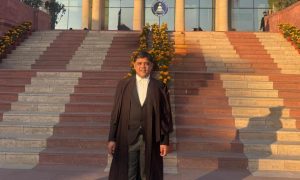This Interview has been published by Pragya Chandni and and The SuperLawyer Team

Can you tell us about your journey and how you ended up pursuing a career in law? What motivated you to choose this profession, and did you always envision yourself working in diverse areas of law?
The first time I studied the Constitution in school, I was amazed that a single ‘document’ defined our nation, government, laws, freedoms, rights, duties, everything. This got me very interested in the law. As I grew up, becoming a litigator became my default option. Although I was open to exploring other options, nothing else has ever appealed to me.
After graduating from law school, I was keen on exploring diverse areas of law. In the first few years of my profession, I decided to join law firms that would give me opportunities in as many areas of law as possible. Litigators are always advised to start out at the trial court. So, I joined a firm where I was part of a team handling civil and criminal matters at the trail court.
In the first five odd years of my career, I was able to gain experience in civil litigation, criminal litigation, arbitrations, regulatory litigation, company litigation, intellectual property matters, consumer matters, tax matters etc. Working in diverse fields in the initial years kept me motivated and gave me the confidence to take on any kind of matter. Even now, having a diverse portfolio of work not only keeps me motivated and excited but also enables me to provide clients with comprehensive and practical advice.
With over 15 years of experience in civil and commercial litigation, arbitrations, regulatory litigation, and criminal litigation, you’ve had a rich and varied career. What would you say has had the most impact on your professional growth?
The most memorable and impactful experience for me has been working with excellent seniors, colleagues, and clients over the years. Any complex litigation is always a team effort. Litigation teams mostly work long hours in close quarters. They see each other’s good sides and bad. They challenge and push each other every day. This team dynamic is crucial for every litigator and perhaps plays the most important part in forging your skills.
Your work seems to span across numerous sectors, from Infrastructure & Real Estate to Banking & Finance to Information Technology. How do you manage to stay well-versed in such diverse areas of law and provide effective representation to clients in each domain?
It is not only important to identify the areas of law that interest you, but also the areas of law that you have an aptitude for. Once you identify these areas, you need to dedicate some study time every day. I feel that the best way to understand an unfamiliar area of law is to read judgments. I try and read every judgment passed by the Delhi High Court and the Supreme Court in the areas of law that I practice in. It takes a lot of time and discipline, but the insights that you gain are invaluable. Other than that, there are so many good resources to keep yourself updated these days. It is also crucial to meet your clients and other experts in the field and understand the latest developments and issues being faced by them.
Arbitrations seem to be a prominent part of your practice. Could you walk us through some of the challenges in handling arbitrations and how you successfully navigate them?
One of the major reasons that parties choose arbitration is to free themselves from the procedural rigors of civil procedure. The irony is that arbitration procedures have become more and more complex and unpredictable with time while civil procedure is becoming more and more streamlined. The law of arbitration is ever evolving, and legal positions flip every now and then. The recent judgments on Stamp Duty and Arbitration Agreements are a case in point. Therefore, it is very important for an arbitration lawyer to be updated on the present legal position and to anticipate future issues. Failure to do so can land your client in endless procedural hurdles which can take years to resolve.
Apart from procedural issues, arbitrations are very fact intensive. For instance, high-stake infrastructure arbitrations normally relate to projects that have taken three to five years to execute. These arbitrations usually involve some technical and scientific issues. There is usually an immense amount of correspondence, records may be scattered, or unavailable, key personnel may have left and so on. Therefore, it is very important for an arbitration lawyer to master the facts to a greater degree than may be required in other proceedings. You need to put yourself in your client’s position and understand the situation that prevailed on the ground. Unless you do this, you cannot present the facts in perspective and ultimately, you will find it difficult to build upon your legal submissions.
You’ve also represented clients in proceedings under the Insolvency and Bankruptcy Code. How do you approach these cases?
The IBC is certainly a work in progress and there are several challenges for every stakeholder. Promotors and Corporate Debtors would say that the law is draconian; Financial Creditors would say that they are frustrated with significant costs, delays, and haircuts; Operational Creditors would say that their interests are not adequately protected; Resolution Applicants would say that they do not get the clean slate that they paid for; the Government and Regulators would say that their claims are being undermined; the Tribunals would say that they are flooded with thousands of petitions and do not have the infrastructure they need.
While representing clients in IBC matters, your approach depends on the needs of your client. When representing Creditors, your goal is to get the petition admitted expeditiously. On the other hand, when representing Debtors, your goal is to oppose the admission of the petition or at least provide your client some time or leverage to be able to negotiate a favorable settlement. Representing Creditors and Debtors has its own challenges, but like any litigation, implementing a winning strategy requires preparation and experience.
Representing clients in commercial disputes is undoubtedly demanding. What does it take to be a good commercial disputes lawyer?
Commercial disputes are very aggressively litigated because of the financial stake involved. When the stakes are high, there is absolutely no scope for any weakness or mistakes. Your pleadings and arguments need to be perfect and precise. Achieving this level of perfection is not easy unless you are willing to work towards it. To handle commercial disputes effectively, you need to have a certain degree of business acumen and a good understanding of the industry. Apart from this, you need to have a strong grasp of contract law and procedural law. Your is not only to resolve the dispute, but to do so as effectively and efficiently as possible.
Besides litigation, you have extensive experience in advisory work, providing opinions on commercial contracts, regulatory matters, environmental protection, and more. How do you balance the responsibilities of advisory work with the demands of litigation?
Balancing litigation and advisory can be challenging at times, but both complement each other. I believe that you can give your clients better advice if you have experience of litigating similar issues in court. Similarly, you can represent your clients better in court if you have been part of the transaction at the implementation stage. For instance, while reviewing a contract, a litigator can provide a new perspective on liquidated damages clauses, limitation of liability clauses, non-compete clauses, dispute resolution clauses and so on. Similarly, if you have advised your client when the contract was being negotiated, you have a better understanding of the transaction and the intent of the parties and can provide better representation should the matter go into litigation.
In your secondments with GE India and Wrigley India, you took on in-house roles. How did those experiences differ from working in a law firm, and what insights did you gain from those roles?
There is a world of a difference between working in a law firm and working in-house. The expectations and requirements are very different. Both have their own advantages and disadvantages. To succeed in either role, you require the same basic legal skills, but you apply these skills very differently. The common thread is that, in both cases, your job is to protect the interests of your client. When you are in-house, you have only one client and when you are working in a law firm you have multiple clients. If you understand this, you can easily transition from one role to the other.
Working in-house for some time in the early parts of my career gave me great insights into what in-house legal teams expect from their external counsels. I also understood the day-to-day challenges that in-house legal teams face. This is something that many external counsels do not even consider. At the end of the day, we are providing a service to our clients and understanding their challenges and expectations is crucial.
As an accomplished professional with years of experience, what advice would you give to fresh law graduates who are just starting their careers in the legal field?
The cliché advice about hard work and constant learning holds true without exception. Apart from this, fresh graduates should seek out good mentors and actively build a strong professional network.
Get in touch with Ankit Parhar-

























